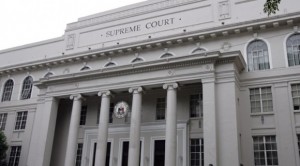SC junks motions vs cybercrime law
BAGUIO CITY, Philippines—The Supreme Court on Tuesday dismissed all pending motions for reconsideration of its Feb. 18 ruling that the Cybercrime Prevention Act of 2012 (Republic Act No. 10175) was constitutional, except for a provision that grants the Department of Justice the power to block websites.
Lawyer Theodore Te, the high court’s spokesperson, said “the same justices maintained their [dissenting votes in the February decision],” referring to Chief Justice Maria Lourdes Sereno and Associate Justices Antonio Carpio, Arturo Brion, Jose Mendoza and Marvic Leonen.
As in the February session when the court ruled on the law, Associate Justices Presbitero Velasco and Estela Perlas-Bernabe did not take part in the deliberations, Te said.
He said rules do not allow the court from hearing a second motion for reconsideration.
Netizens’ outrage
Netizens were outraged by the cybercrime law primarily because it allows the government to prosecute online bloggers, social media participants and online journalists, for criminal libel.
The law, which was designed to combat online child pornography and other cybercrimes, was suspended for a year when its constitutionality was challenged.
The court dismissed 15 motions for reconsideration filed by various petitioners, among them Sen. Teofisto Guingona III, Bayan Muna Rep. Neri Colmenares, the National Press Club and the Philippine Internet Freedom Alliance.
The petitioners questioned 19 provisions of the law. In February, the court struck down four of these provisions as unconstitutional: Section 4 (c) which punishes anyone who posts unsolicited commercial information or spams; Section 12 which grants government the authority to record data traffic in real time; Section 19 which allows the government to block websites, and Section 7 that deals with the prosecution of an offender for online libel because it violates the prohibition on double jeopardy.
Double jeopardy is a legal principle which states that no individual can be prosecuted and convicted twice for the same crime.
The high court ruled that the law merely identifies the computer and the Internet as another medium for the publication of libelous materials, but libel is already punished by the Revised Penal Code.
RELATED STORIES
SC junks all motions for reconsiderations against Cybercrime ruling
3 views on SC ruling on cybercrime prevention law
Kabataan parylist asks SC to reconsider decision on cybercrime law
